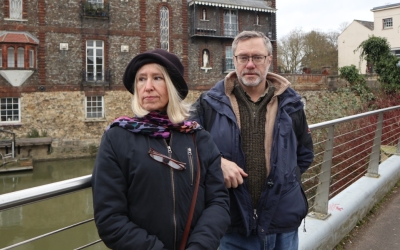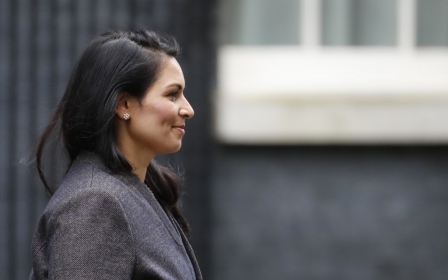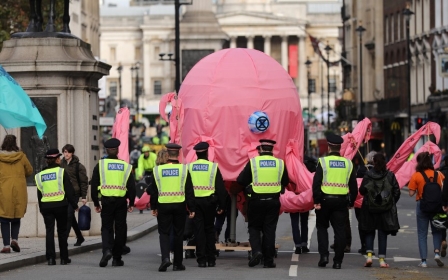Counter-terrorism programmes are violating human rights, UN expert says

Counter-extremism programmes, including those employed in the United Kingdom and the United States, are contributing to human rights violations, according to a United Nations expert.
A report submitted to the Human Rights Council on Wednesday said religious groups, minorities and civil society actors in particular have been victims of rights violations and are targeted under the guise of countering "extremism."
Special rapporteur Fionnuala Ní Aolain said any programme that relies on teachers, social workers and health-care staff to report signs of radicalisation should be scrapped.
"The negative impact cannot be overstated," her report read. Such measures break the "fragile trust" between communities and public services.
The report also found that many counter-extremism practices result in "overselection and overreporting" on discriminatory grounds.
Muslim communities have repeatedly claimed they have been disproportionately targeted by the UK's Prevent programme, as well as the Countering Violent Extremism Task Force in the US.
"Violations of the rights of religious and ethnic minorities are being enabled by 'deradicalisation' policies and practice," the report said.
What is the Prevent Strategy?
+ Show - HidePrevent is a programme within the British government's counter-terrorism strategy that aims to “safeguard and support those vulnerable to radicalisation, to stop them from becoming terrorists or supporting terrorism”.
It was publicly launched in the aftermath of the 2005 London bombings and was initially targeted squarely at Muslim communities, prompting continuing complaints of discrimination and concerns that the programme was being used to collect intelligence.
In 2011, Prevent's remit was expanded to cover all forms of extremism, defined by the government as “vocal or active opposition to fundamental British values, including democracy, the rule of law, individual liberty and mutual respect and tolerance of different faiths and beliefs.”
In 2015, the government introduced the Prevent Duty which requires public sector workers including doctors, teachers and even nursery staff to have “due regard to the need to prevent people being drawn into terrorism”.
A key element of Prevent is Channel, a programme that offers mentoring and support to people assessed to be at risk of becoming terrorists. Prevent referrals of some young children have proved contentious. 114 children under the age of 15 received Channel support in 2017/18.
Criticism of the Prevent Duty includes that it has had a “chilling effect” on free speech in classrooms and universities, and that it has turned public sector workers into informers who are expected to monitor pupils and patients for “signs of radicalisation”. Some critics have said that it may even be counter-productive.
Advocates argue that it is a form of safeguarding that has been effective in identifying and helping troubled individuals. They point to a growing number of far-right referrals as evidence that it is not discriminatory against Muslims.
In January 2019 the government bowed to pressure and announced that it would commission an independent review of Prevent. This was supposed to be completed by August 2020. After being forced to drop its first appointed reviewer, Lord Carlile, over his past advocacy for Prevent, it conceded that the review would be delayed.
In January 2021 it named William Shawcross as reviewer. Shawcross's appointment was also contentious and prompted many organisations to boycott the review. Further delays followed. Shawcross's review, calling for a renewed focus within Prevent on "the Islamist threat", was finally published in February 2023 - and immediately denounced by critics.
The report added that many countries engaged in counter-extremism efforts have policies that are not based on scientific research and could instead be "counter-productive".
States engaged in counter-terrorism efforts should ensure "that policies and programmes aimed at preventing violent extremism are evidence-based and scientifically sound" and do not stifle peaceful political dissidence, criticism, non-violent protest or freedom of religion, it said.
Many post-9/11 programmes have resulted in polarising rhetoric that leads to a "with us or with the terrorists" mentality that has "led to the targeting of civil society members who question the legitimacy of the counter-terrorism measures", the report said.
The UK's Prevent programme has for years sparked widespread criticism among rights groups and Muslim advocacy organisations.
Last month, the British government said it would appoint an independent reviewer of its Prevent strategy through an open and transparent process, after human rights campaigners threatened it with further legal action.
The UK made similar promises last year, committing to commission an independent review of Prevent in parliamentary legislation.
Still, in December the Home Office was forced to drop its appointed reviewer, Lord Carlile, following a legal challenge by Rights Watch (UK) over his past advocacy for Prevent.
This time, the Government Legal Department said that the reviewer for the forthcoming review would be appointed "through full and open competition".
Middle East Eye propose une couverture et une analyse indépendantes et incomparables du Moyen-Orient, de l’Afrique du Nord et d’autres régions du monde. Pour en savoir plus sur la reprise de ce contenu et les frais qui s’appliquent, veuillez remplir ce formulaire [en anglais]. Pour en savoir plus sur MEE, cliquez ici [en anglais].





